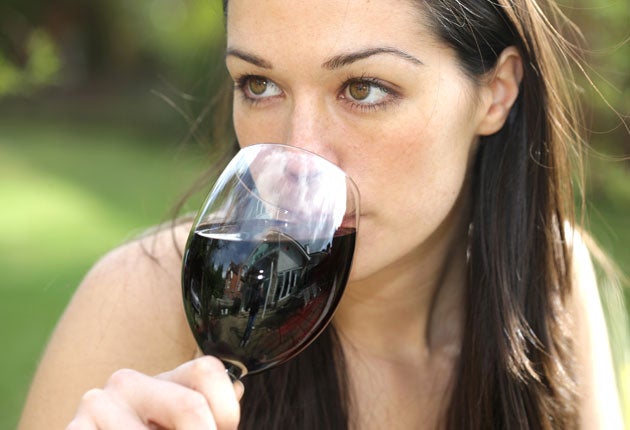Want to avoid cancer? Drink weaker wine, say scientists
Substitute German riesling for Australian chardonnay, experts advise

Your support helps us to tell the story
From reproductive rights to climate change to Big Tech, The Independent is on the ground when the story is developing. Whether it's investigating the financials of Elon Musk's pro-Trump PAC or producing our latest documentary, 'The A Word', which shines a light on the American women fighting for reproductive rights, we know how important it is to parse out the facts from the messaging.
At such a critical moment in US history, we need reporters on the ground. Your donation allows us to keep sending journalists to speak to both sides of the story.
The Independent is trusted by Americans across the entire political spectrum. And unlike many other quality news outlets, we choose not to lock Americans out of our reporting and analysis with paywalls. We believe quality journalism should be available to everyone, paid for by those who can afford it.
Your support makes all the difference.Wine drinkers should switch to lower-alcohol varieties to reduce their chances of getting cancer, scientists say today.
By substituting a light German Riesling (10 per cent alcohol) for a heady Australian Chardonnay (14 per cent), people can continue to enjoy a glass or two at the same time as reducing the risk to their health. A daily wine drinker who typically enjoys a large glass (250ml) could cut their risk of bowel cancer by 7 per cent by making the change. Most people would barely notice the difference but would significantly boost their chances of avoiding the disease, scientists argue.
The advice comes as researchers in Scotland report that Scots drink the equivalent of almost a bottle of vodka a week per head on average, 25 per cent more alcohol in a year than the English or the Welsh. Average consumption in Scotland is 12.2 litres of pure alcohol per annum, equivalent to 46 bottles of vodka. In weekly terms, it is equivalent to 10 pints of beer a head, or two and a half bottles of wine. As many people do not drink at all, average consumption among those that do will be higher still. The Scottish Government is pushing for a minimum price for alcohol to tackle the social and physical harm it causes.
Alcohol is known to increase the risk of several cancers including those of the breast and bowel. Consumption has soared in recent decades and three times as much is now consumed per head as in the middle of the past century. It is estimated to cause 30,000 to 40,000 deaths a year. As well as bowel cancer, which affects 37,000 people a year in the UK, there is also strong evidence that switching to a lower-alcohol wine would reduce the risk of breast cancer, liver cancer, and cancers of the oesophagus, mouth, pharynx and larynx. The reduction in risk would be of the same order as that for bowel cancer, the World Cancer Research Fund (WCRF) said.
Scientists estimate 20,000 cases of cancer a year are linked to alcohol. The charity recommends that if people drink at all, they should limit consumption to two drinks a day for a man and one for a woman. Dr Rachel Thompson, the WCRF's science programme manager, said: "From a cancer-prevention point of view it is best not to drink at all. But we have to be realistic, and the fact is that many people in the UK enjoy a drink and see it as part of their social life. If you drink quite a lot at the moment, the best advice is to reduce the number of drinks you have. But if people do not want to do this, switching to a lower-alcohol alternative is still something positive they can do. Making this change might seem quite minor but it could have a real impact on cancer risk. If everyone who drinks 14 per cent wine switched to lower-alcohol wine, it is likely hundreds of cancer cases in the UK a year could be prevented."
Dr Thompson said although lower-alcohol wines were more difficult to find in high-street stores, it was a lifestyle change that could make a long-term health difference. She added: "The food and drink industry does now seem to be taking the issue more seriously. But there is still much more it should be doing. We would like to see supermarkets and off-licences make it easier for their customers to choose less unhealthy options."
The charity added people could also reduce their cancer risk by doing the same with other alcoholic drinks.
Less is more: Healthier vintages
*McGuigan Chardonnay, 9.5 per cent. Fresh, crisp with a creamy citrus character and a clean, dry finish. (Tesco, £6)
*McGuigan Shiraz, 9.5 per cent. Medium-bodied, with juicy red berry fruit, a hint of vanilla and a clean finish. (Tesco, £6.07)
*Piesporter Michelsberg Riesling, 9.5 per cent. Cold fermented to produce a refreshing, crisp and aromatically lively white. (Majestic, £5.99)
*Ernst Loosen Erdener Treppchen Riesling Kabinett, 10 per cent. Flavours of apples and pears, and a crisp, refreshing finish. (Marks & Spencer, £10.79)
*Giardini Pinot Grigio, 9.5 per cent. Bursting with apple and pear aromas. (Marks & Spencer, £4.49)
*Dr Loosen Riesling, 8.5 per cent. Fruity, with a refreshingly crisp taste. Sainsbury's, £6.78)
Join our commenting forum
Join thought-provoking conversations, follow other Independent readers and see their replies
Comments